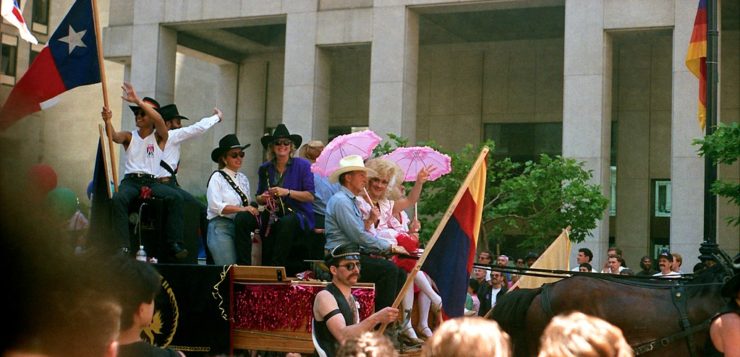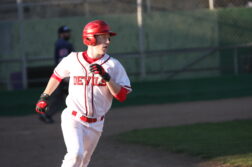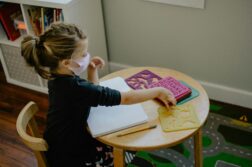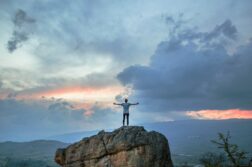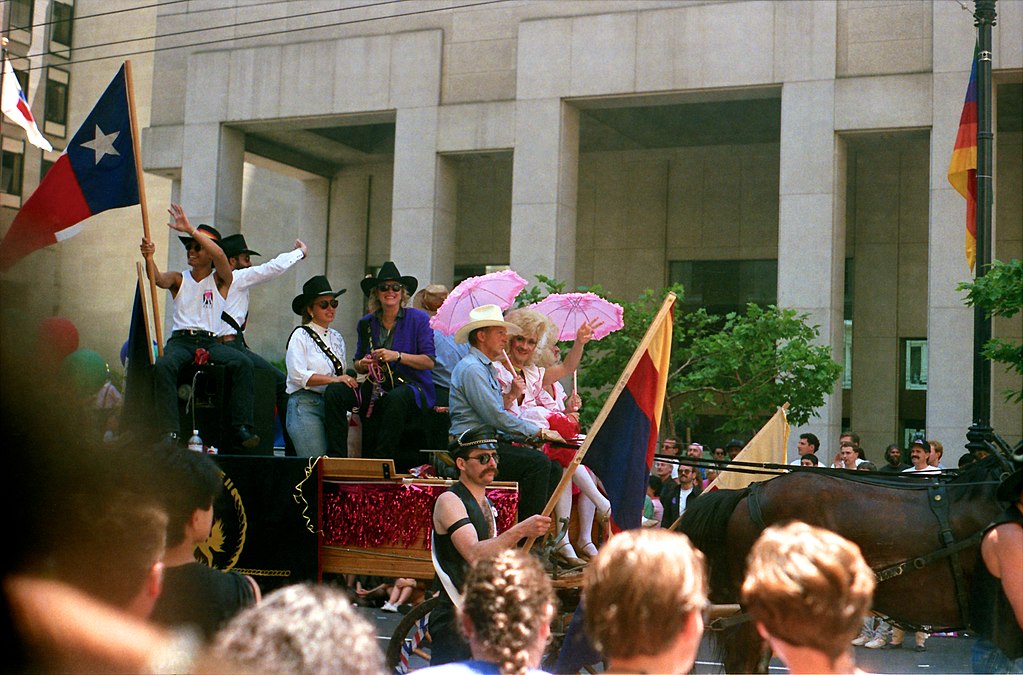
For me, everything changed in 1996.
I’d felt queer yearnings since I was a boy. While I loved women, I also wanted to fool around with boys. I’d tried a taste of that forbidden fruit in college during the 80s, but was otherwise too scared to actually come out. Years of homophobic Catholic schooling, a decade of equally homophobic Southern Baptist church-going, the continued criminalization of “unnatural” acts in Louisiana, a lifetime of having been called a faggot, a queer, a pansy, a pervert – and then the various crushes, the unrequited feelings, the lack of any role model, the absence of any gay adult I could talk to. Nothing added up to coming out. I had a gay uncle, but he died when I was 12, right before my entrance into puberty, when he might have been able to help in some way. Instead, his death of multiple myeloma cancer was read by some relatives as a divine punishment for his queer ways. Any creaking open closet door was slammed shut. I waited as long as I could. My move to Colorado, and then my divorce from a woman, allowed me the chance to take that first tentative step to assert my identity as a queer man.
Richard (not his real name) and I took off from Pueblo in the summer of 1996 looking for a queerer life. Southern Colorado, with its Amendment Two forbidding queers from claiming discrimination, was both beautiful and unwelcoming. Another home I needed to flee. But still, I’d just gotten divorced, was dating guys, and Richard was my first boyfriend, a student who’d just graduated from my school. A smart, sexy guy. I was 28, he was 22 or maybe 23. I remember meeting him through my best friend Karen, and the only other out queer on the campus where I taught English. She’d been one of Richard’s teachers and introduced us on a group trip to a gay bar in Colorado Springs, home of Focus on the Family and James Dobson. But there we were, boys dancing with boys in the heart of homophobic conservatism. And the military guys on the down low were so fucking hot. They risked everything just showing up at a bar like that. Don’t ask, don’t tell? Don’t even bother. I felt lucky to be there. I’d waited a long time to dance next to men like this. And when Richard said yes, he’d go on a date with me, I felt my life tilt a bit, seeing the world from a slightly different angle, my body shifting in relation to others. I’d always felt a little askew, somewhat cloaked, trying to hide my desires. But now, voicing them, my body aligned a bit more with the bodies of those around me, swaying and pulsing to beats becoming my own.
Within a month of dating we were ready to take off – heady with romance, eager to set ourselves free. Richard’s family had largely rejected him and now, newly graduated, he wanted to start over. We sold much of what we owned, packed the rest into my leased car, hugged our friends goodbye, and set off to Seattle, a place nearly chosen at random, an emerald city, a locale seemingly rife with possibility, the future. It was the 90s and tech was all the rage, Seattle was an epicenter of innovation. We could network, remake ourselves. Pueblo to Denver, Cheyenne, across the wastes of southern Wyoming where Matthew Shepard would die in just a couple of years, slicing across a bit of Utah where Mormon boys had their genitals shocked to deter their homoerotic inclinations, into southern Idaho and Boise, where we made raucous love in a cheap hotel. I’d brought along my handcuffs, always something of a kinkster, now feeling free to explore a range of desires. I cuffed Richard’s hands, flipped him over, and slapped his ass. You’re so fucking hot. I’d never been told that before. I knew I didn’t deserve to be told something like that. I was never worthy enough to be desired because my desires themselves were so unworthy. I’d learn in time to value myself. Then on across Oregon where even a flat tire couldn’t deter us, through The Dalles after losing a great deal of altitude, coming off some continental shelf headed to the sea. Portland was a revelation. I’d never been this far west before, but here was a city amongst mountains and tress, full of coffee and books. I thought we could stay here, just plop down right here and not look back. But we pushed on to Seattle and the summer ahead.
Seattle did not disappoint. Lovely green, clever people, good coffee. We stayed for a bit with one of Richard’s friends, volunteered with an eco-activist group, hung out an Internet café, even looked at an apartment or two, roaming the streets of Capitol Hill. We celebrated the breaking summer news that the US Supreme Court had overturned Colorado’s Amendment Two in the decision Romer v. Evans. Coloradans wouldn’t be able to prevent lesbians, gays, and bisexuals from claiming discrimination when thrown out of housing or fired form their jobs just for being queer anymore. We were jubilant! Richard went outside to smoke a cigarette and came back in for some celebratory fucking, but I couldn’t kiss him. I’d never kissed a guy who’d just smoked a cigarette; all I could taste was ash. He turned away, upset, not unjustly miffed that I thought him repulsive in that moment. A small sign of more problems to come. After a few weeks in Seattle, I became homesick for Colorado, where I had friends, and a job. I wanted to go home, but Richard wanted to stay in Seattle, where he was starting to go door-to-door for an activist group. I had a panic attack one morning after I’d applied for a summer job in a nursing home. I’m not above changing someone’s adult diapers, and I hope someone will change mine when it’s my turn, but in my late 20s I was tasting the bitterness again of feeling displaced, of having left a place yet again to try to find a better life somewhere else. If Amendment Two could be overturned, perhaps I could make my own new turn in Colorado, where I’d already started making a home. I was ready to go back.
Richard balked about returning to Pueblo but accompanied me anyway. Within a few weeks, I was back in the classroom, living as an openly gay man in a place that didn’t quite feel ready for it. I couldn’t walk outside my apartment’s front door and visit the grocery store without running into someone I knew, a former student, campus staff, someone you’d just see around town. I was always waiting for the confrontation, the call out. And they came at times. But I brushed them off. I was largely left alone. And in 1997 a group of us— students and Karen and I— huddled around the television to watch Ellen Degeneres’s character come out as a lesbian on her television show. Karen and I wrote an essay about the coming out, one of our first publications together, and we delivered a version on campus to a packed room. A colleague from the psychology department asked us what data we had that could verify what we were talking about, that could substantiate our interpretations about the show and media coverage of it. We had all the data we needed. We had ourselves, our own experiences, our journeys to this moment. We couldn’t hide anymore. And we didn’t.
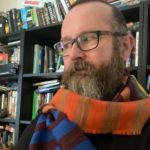 Jonathan Alexander is the author of the several queer memoirs including, must recently, Stroke Book, The Diary of a Blindspot and Dear Queer Self: An Experiment in Memoir. For more, see his website at https://www.the-blank-page.com.
Jonathan Alexander is the author of the several queer memoirs including, must recently, Stroke Book, The Diary of a Blindspot and Dear Queer Self: An Experiment in Memoir. For more, see his website at https://www.the-blank-page.com.


